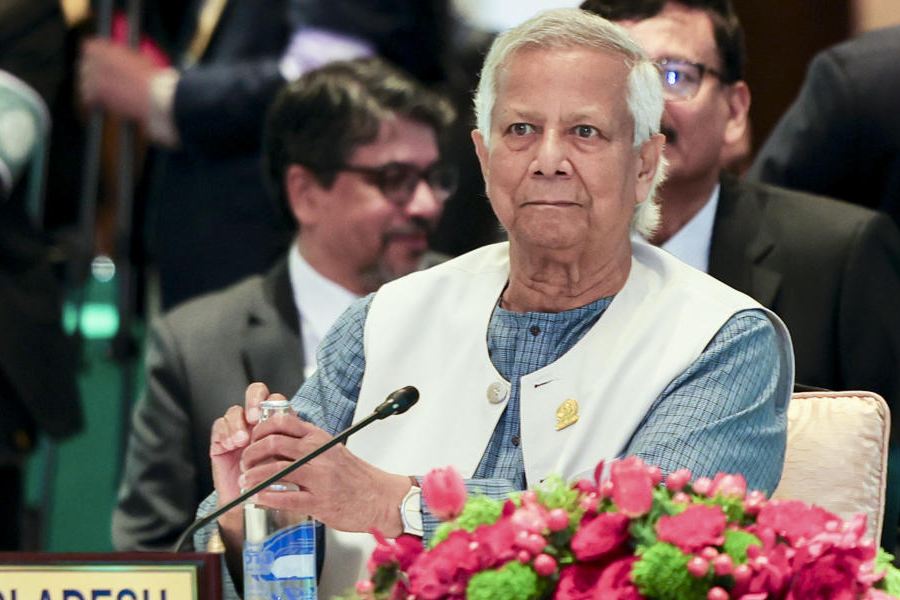Disappointment marked the first week of Nandikar’s 20th National Theatre Festival, though we must give Nandikar a standing ovation for reaching this milestone. The two best productions, National School of Drama Repertory Company’s Janeman and Benaka’s Jokumaraswami, were old and had come here before. The new ones could not measure up to them, particularly exposing an alarming inattention to detail. However, we must acknowledge that besides Ionesco’s The Lesson (Centre for Asian Theatre, Dhaka) and Dario Fo’s Accidental Death of an Anarchist (Natya Aradhana, Sholapur), all the others comprised original playwriting. At least on paper.
An informant told me that Shirish Athavle’s Mitra (by Suyog, Pune) has an American source, but I could not identify it. The outstanding solo performance so far came from this Marathi play — Shreeram Lagoo returns to form as a grandfather recovering from a stroke, gradually regaining control of his paralysed right side through positive thinking. The rest of Mitra collapsed around his inspiring portrayal. The script is tedious, sentimental and without surprise, the potential counterpoint to Lagoo (his nurse) a hopelessly wooden actress, and Rajan Bhise’s set with pink and blue walls a pathetic apology. Vijay Kenkre obviously directed it as a vehicle for Lagoo; even so, it is inconceivable that doctors and nurses can allow a patient to continue wiping his tears unhygienically on his clothes.
The NSD Rep failed gloriously with G.P. Deshpande’s Chanakya Vishnugupta translated into Hindi. Granted, young Souti Chakraborty makes his directorial debut and the Marathi original itself shows little justification for adapting Visakhadatta’s classic Mudra-Rakshasa, but the production suggests that NSD has turned to training actors for TV serials. Everyone stood facing the imaginary camera, wore pained expressions on their faces, and shouted their speeches as if all kings and officials have the same non-human manner of declamation. To coach the cast further in TV melodrama, Rajendra Prasanna had his music on tape and injected tension/suspense effects at key moments. The three-tier set was unaesthetic and unnecessary. Tikam Joshi (Chanakya) has acted much better in the past.
The other Delhi participant, Nirakar, staged Dostoevsky’s The Idiot in an uncredited Hindi version titled Bavla. If they used Simon Gray’s definitive dramatisation, it was not apparent; if they did not, they should have. Theoretically, I understand director Anamika Haksar’s aim to upset conventional expectations of dramatic structure and express the chaotic mind of the “insane”, but it resulted practically in a pretentious attempt at arty intellectualism. If she has decided to speak to a niche audience of intelligentsia, she may not realise that she is alienating the wider public for whom her message holds greater import. She has an eye for striking visual imagery, but these novelties left Dostoevsky’s sensitive novel out in the cold. It did not help that the heroine’s gown kept slipping off.
The Tamil entry, S.L. Nanu’s Ni-jam Alla Kadhai (Stage Creations, Chennai), did a huge disservice to South Zone Cultural Centre who sponsored it. Tamil theatre has better representatives than this amateurish comedy about magic moneyplants and materialistic schem-es. The director, K. Ramamoorthy, and a mute Veerappan look-alike who takes the family hostage, reve-al some acting flair, but local sc-hools can offer superior material.
Better acting featured in English-language imports, though these too suffered from imperfection. Sarah Jones’ Waking the American Dream (CREA, TARSHI and Swayam) was eagerly awaited on the strength of her one-woman show two years ago. Once again, she displayed a chameleonic virtuosity in enacting a dozen American poets. A moving and important testament for tolerance, her script nevertheless had a certain predictability—immigrants ought to have hard-life stories to recount—while her use of the mike obscured her facial mobility. Her voice, with its ability to strike and hold several distinct tonal registers, needed no amplification whatsoever.
Prime Time Theatre’s Womanly Voices (Sanskriti Sagar) anthologised three short stories dramatised and directed by Lillete Dubey. As with Bavla, it is difficult to turn fiction into theatre. And the chosen stories all have a typically sensational twist in the end, which comes across as contrived or grotesque on stage. Thus, suddenly, the maid sleeps with her mistress’ would-be husband in revenge (Wajeda Tabbassum’s Utran); starving ghostly villagers swarm over the relief officer (Mahasweta Devi’s Shishu); and the music patron kills the child prodigy (Gita Mehta’s The Teacher’s Story). Having said that, there are fine performances by Joy Sengupta in several roles, Neha Dubey as the maid, and Suchitra Pillai as the angry Bengali housewife in Teacher’s Story. Dubey has a laudable penchant for unusual drama and artistic mise-en-scene.











